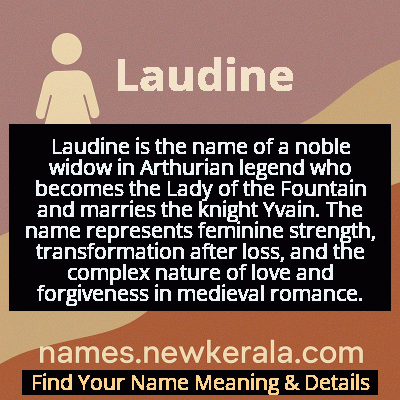Laudine Name Meaning & Details
Origin, Popularity, Numerology Analysis & Name Meaning of Laudine
Discover the origin, meaning, and cultural significance of the name LAUDINE. Delve into its historical roots and explore the lasting impact it has had on communities and traditions.
Name
Laudine
Gender
Female
Origin
Arthurian
Lucky Number
3
Meaning of the Name - Laudine
Laudine is the name of a noble widow in Arthurian legend who becomes the Lady of the Fountain and marries the knight Yvain. The name represents feminine strength, transformation after loss, and the complex nature of love and forgiveness in medieval romance.
Laudine - Complete Numerology Analysis
Your Numerology Number
Based on Pythagorean Numerology System
Ruling Planet
Jupiter
Positive Nature
Optimistic, inspirational, and creative.
Negative Traits
Scattered, exaggerating.
Lucky Colours
Yellow, gold, purple.
Lucky Days
Thursday.
Lucky Stones
Yellow sapphire.
Harmony Numbers
1, 2, 9.
Best Suited Professions
Arts, writing, communication.
What People Like About You
Creativity, optimism.
Famous People Named Laudine
Laudine of the Fountain
Arthurian noblewoman
Central figure in Chrétien de Troyes' 'Yvain, the Knight of the Lion' as the widow who marries Yvain
Laudine de Landuc
Literary character
Appears in various Arthurian romances as a symbol of noble widowhood and complex marital relationships
Laudine the Fair
Mythical ruler
Guardian of the magical fountain in Brocéliande forest, representing feminine power and sovereignty
Name Variations & International Equivalents
Click on blue names to explore their detailed meanings. Gray names with will be available soon.
Cultural & Historical Significance
Beyond her literary significance, Laudine represents the medieval fascination with the 'marriage of enemies' trope and the concept of transformative forgiveness. Her guardianship of the magical fountain connects her to Celtic mythology's tradition of sovereignty goddesses and water deities, suggesting older mythological roots beneath the Christianized romance. Her character continues to interest scholars for what she reveals about medieval attitudes toward widowhood, female agency, and the complex negotiation between personal desire and political necessity in aristocratic marriages.
Extended Personality Analysis
Laudine's personality reflects the complex emotional landscape of a noblewoman navigating loss, duty, and unexpected love. Initially portrayed in deep mourning for her slain husband Esclados, she demonstrates intense loyalty and genuine grief, yet possesses the political acumen to recognize that her lands need protection. This practical wisdom leads her to the surprising decision to marry Yvain, her husband's killer—a choice that reveals her capacity for strategic thinking and her understanding of feudal responsibilities.
Her character evolves to show remarkable emotional intelligence and strength of will. When Yvain breaks his promise to return from knightly adventures, her righteous anger demonstrates her strong sense of justice and the importance she places on marital commitment. Yet her eventual forgiveness shows her capacity for compassion and understanding. Throughout her story, Laudine maintains her dignity and authority as ruler of her lands, embodying the medieval ideal of the noble lady who balances emotional depth with political responsibility, making her one of the most fully-realized female characters in Arthurian literature.
Modern Usage & Popularity
In contemporary naming practices, Laudine remains exceptionally rare and is primarily used by dedicated Arthurian enthusiasts or those seeking highly distinctive literary names with medieval resonance. The name has never appeared on popular baby name charts and is considered a specialist choice, often selected by parents with particular interest in medieval literature, Celtic mythology, or unique historical names. Its association with widowhood and complex marital dynamics may limit its mainstream appeal, though it carries an undeniable air of aristocratic elegance and literary sophistication. The name's usage is mostly confined to academic circles, historical reenactment communities, and families with strong connections to Arthurian studies or medieval history.
Symbolic & Spiritual Meanings
Laudine symbolizes the profound transformation that can follow loss and the complex interplay between grief and renewal. As guardian of the magical fountain, she represents the connection between feminine wisdom and natural mysteries, embodying the idea that true strength often emerges from navigating emotional depths. Her story serves as a powerful metaphor for second chances and the capacity of the human heart to heal and love again while honoring past relationships. The fountain she protects becomes symbolic of emotional truth and the continuous flow of life's transitions, while her journey from widow to wife illustrates the medieval concept of fortune's wheel—how life's circumstances can dramatically change, requiring adaptability and courage. Her character ultimately represents the reconciliation of opposites: grief and joy, loyalty and forgiveness, personal desire and social duty.

